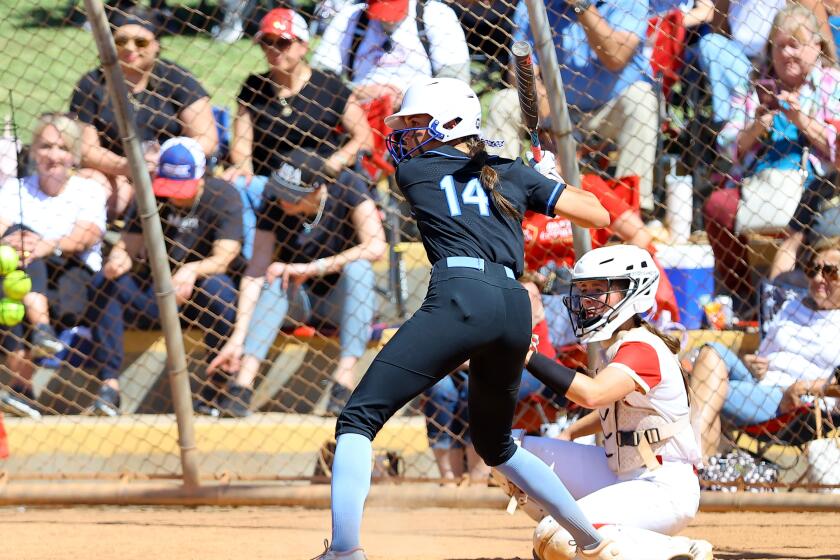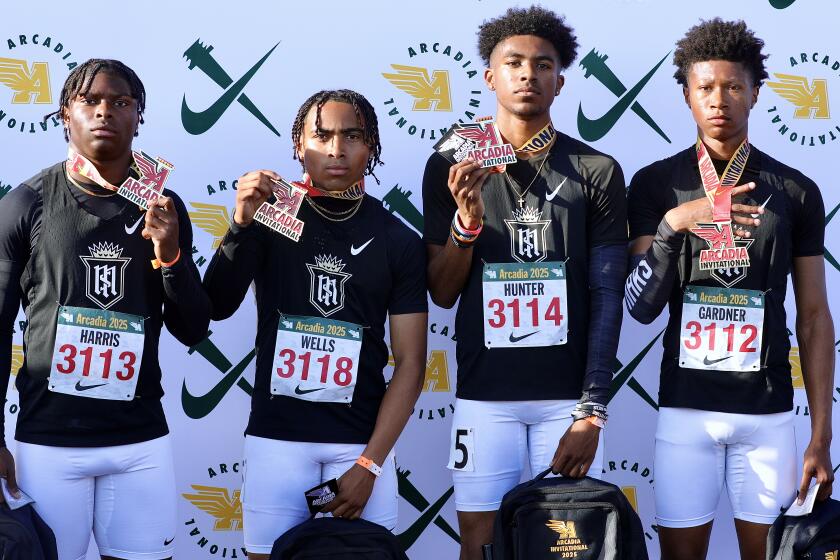COMMENTARY : Coverage of Clemens Incident Was Exemplary
- Share via
CBS was all over the Terry Cooney-Roger Clemens incident in Oakland Wednesday. It had stark pictures, good reportage, sharp commentary on the spot. When television covers a development like this so well, it leaves all too little for newspapers, which do not reach the public until half a day later.
The excellent, repeated replays in slow motion of Clemens’ diatribe against Cooney were a lip reader’s delight. CBS was quick to get reports from the field by roving reporter Jim Gray. Producer Ed Goren’s pre-planning paid off because CBS had American League umpire Don Denkinger and National League umpire Bruce Froemming in the New York studio working the two playoff series and available to be called on for comments during the telecasts. Gray taped an interview with Clemens as he walked into the Boston dressing room, and that was played after the game. Only Pat O’Brien’s interviews with the umpires, which were a bit oversolicitous, could be faulted.
Jim Kaat was not hesitant in voicing an intelligent, measured opinion condemning Cooney’s quick action. Best of all was the insertion of a pointed commentary by Tim McCarver in response to the umpires’ knee-jerk defense of one of their own. With executive producer Ted Shaker and producer Ric LaCivita calling the shots, McCarver came on from his hotel in Pittsburgh and said, “Volatility and common sense is involved” and argued that “the punishment did not fit the crime.” Without condoning Clemens’ idiocy, he contested the umpires’ contention that an expulsion in such a situation was automatic. He shrewdly cited his own experience as a player. As a former catcher, he said, he had often argued and heard others use obscenities in such situations.
It was McCarver at his best.
This viewer would have liked to have seen Boston Manager Joe Morgan take his appeal right on the spot to American League President Bobby Brown. In the 1934 World Series, Commissioner Kenesaw Landis took a direct hand in ordering the St. Louis Cardinals’ Joe Medwick, a target of Detroit fans throwing garbage, out of the game to avert a riot. Brown wouldn’t have done anything, as he indicated in backing up his umpire in a later interview with Kaat, but at least somebody with the authority to overrule the umpires would have had a shot at reversing the outrageous decision.
McCarver and Jack Buck were remiss Tuesday night, ignoring a key aspect of the big play involving Bobby Bonilla. When Bonilla tried to make third on a ball hit off the fence and was cut down by a great throw from Eric Davis, McCarver and Buck extolled Davis. They did not pick up, however, on replays that showed Bonilla watching his drive in a tardy takeoff toward first base. Had Bonilla run full out all the way, he would have had no trouble making third base.
McCarver did not disagree. He said, “I was so consumed with what Eric Davis was doing, I didn’t think Bonilla’s running was that glaring. I think that in such a situation, there is a subtle feeling that by focusing on Bonilla’s running, we would have been taking away from Davis’ great play.”
CBS did a little checkbook journalism when it used Darryl Strawberry as a paid “expert analyst” before Tuesday night’s National League game. They had used managers and a coach in previous telecasts but obviously chose Strawberry only because it was a way of touching on what is considered big news these days: his destination next year. Strawberry, who changes his mind with the weather, announced this time that he would go to Los Angeles if the Dodgers and New York Mets offered him the same terms to sign.
An aside to Mets’ General Manager Frank Cashen in relation to Strawberry’s threats. It reminds me of a story by humorist Sam Levenson, who, when he was unhappy as a child, would tell his mother he was going to run away from home. “When I told her this,” Levenson said, “she, in her wisdom, would announce, ‘Good, I’ll make you sandwiches.’ ”
O’Brien, CBS’ pregame host, usually is a good force for correct use of the language. But he is no role model to the nation’s schoolkids on geography. Before the first National League game in Pittsburgh, O’Brien spoke of the city “where the mighty Ohio meets the Allegheny and the Monongahela. They call this the confluence of the three rivers.”
Not only was O’Brien erroneous, but he was going against the time-honored and mellifluous description often repeated by former Pirate Ralph Kiner. Pittsburgh is the city “where the confluence of the Allegheny and the Monongahela forms the mighty Ohio.” Scholars I called at the University of Pittsburgh and the Carnegie branch library were astounded at O’Brien’s gaffe, and not even the fact that he is originally from South Dakota was deemed excuse for such ignorance.
More to Read
Go beyond the scoreboard
Get the latest on L.A.'s teams in the daily Sports Report newsletter.
You may occasionally receive promotional content from the Los Angeles Times.










